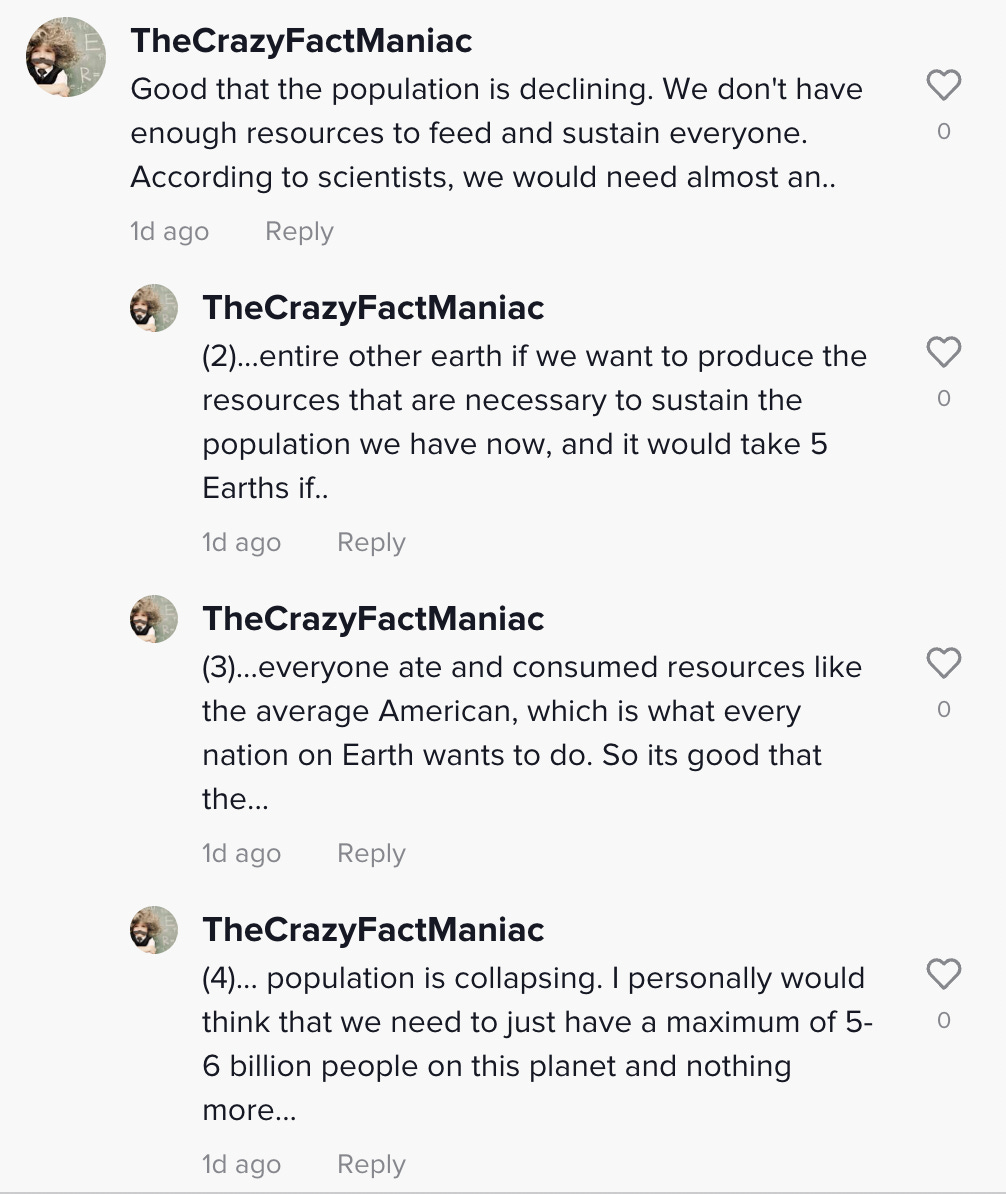Green Misanthropy on TikTok
A diet of environmentalist paranoia has turned Gen Z and Millennials into misanthropes.
Here’s a selection of the comments left on my TikTok video explaining that the world is facing a dire underpopulation crisis.
There was a few dozen “Thanos was right” style takes, which—for those who aren’t fans of superhero movies—is a reference to a Marvel villain who snaps his fingers and erases half the population of the universe. Even accounting for hyperbole and the inherently trollish nature of pseudonymous internet culture, it’s odd that so many commenters feel comfortable invoking even fictional genocide when contemplating the future of the human race.
Of course, all of this is anecdotal, but my underpopulation video received more comments than any other video I’ve yet made, garnering 229k views and 3.8k comments. That means that ~1.6% of viewers left a comment. For sake of comparison, my video calling Norway’s sovereign wealth fund a capitalist success story had only 2.9k comments off of 2.5 million views, a rate of just 0.116%. Both are controversial takes, but disputing overpopulation attracted over 10x the outrage. (My TikTok audience is roughly three quarters Millennial and younger.)
These sentiments were often tied to a belief that humans are environmental parasites.
You could pull all of these ideas—running out of resources, a population bomb, ozone hole, etc—straight from a 70s environmentalist manifesto. Even if Paul Ehrlich lost his famous wager over impending resource scarcity, he has clearly won the battle for the hearts and minds of future generations.
Those ideas were certainly commonplace in American culture when I was a kid in the 90s, from elementary schools collecting coins to preserve the Amazon rainforest to watching Captain Planet fight Looten Plunder or Sly Sludge on Saturday mornings. (I once interviewed a Captain Planet writer for a podcast.)
But the reality is that almost every concern of the early environmental movement in America, from roughly the 1960s-1990s, has been substantially remediated or mitigated. Burning rivers are barely a memory. We have a third more trees than existed in 1952. Air quality hasn’t been this clean for more than a century.
The good news keeps pouring in, but panic doesn’t wear off easily after half a century of being told that existential environmental dangers lurk around every corner. And I see that keenly whenever I talk about related issues on TikTok. Humans are compared to pests or cancer or a virus, which justifies a remarkable degree of callousness.
It’s as if environmentalism has been reduced into a stew of misanthropy, a blind hatred of humanity. It’s such a contrast to the environmentalism that I subscribe to, a belief in the remarkable ability of humans, when properly incentivized, to improve their relationship to nature and heal the environmental harms created by past generations.
Interestingly, many commentators mistook solvable problems created by bad policy as evidence of overpopulation. For instance:
Automobile-first infrastructure and exclusionary zoning policies drive up the cost of housing and push people into soul-sucking commutes. Being stuck on the 405 in LA during rush hour would be enough to turn anyone into at least a little bit of a misanthrope!
I take it as a reminder that those interested in advancing human progress need to work at least as hard at promoting a message of humanism and optimism as the doomsayers like Ehrlich have been working to instill anti-humanism and pessimism.











